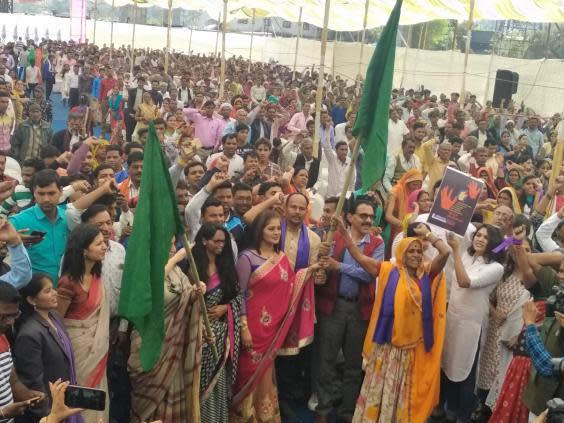Women in India walk 10,000km across 24 states to raise awareness about rape
Thousands of women have walked 10,000 kilometres (6,200 miles) across India – covering 200 districts in 24 states – to raise awareness about the prevalence of rape.
The Dignity March, which started in Mumbai in December and ends in Delhi on Friday, has drawn sexual assault survivors from across the subcontinent.
They have been joined by family members, activists, politicians, lawyers, police and actors. The historic march has strived to shine a spotlight on a culture of victim shaming and blaming, which campaigners say has allowed perpetrators to evade punishment. It also aims to highlight the obstacles women and children face in accessing justice.
Rape is one of the most under-reported crimes in India – with some estimates indicating 90 to 95 per cent of rape cases remain unreported.
The conviction rate for crimes against women overall in India is very low – only 18.9 per cent and the lowest in a decade – according to the latest official crime statistics from 2016. Whereas, the average conviction rate for all crimes is 47 per cent.
“We are marching to change society’s attitudes to sexual assault,” Divya Srinivasan, an Indian lawyer who specialises in women’s rights, told The Independent.
“Every day, survivors are silenced, discriminated against, threatened, intimidated, and coerced into settling or dropping their cases,” she said. “An intersectionality of vulnerabilities creates even more difficulties for women and girls who are further marginalised on the basis of class, caste, religion and disability.”
Ms Srinivasan said she had attended an emotionally charged event in Ahmedabad, the largest city in the western Indian state of Gujarat, which was on the march route.
“A number of survivors shared stories about how they were stigmatised by society after being raped and also discussed their experiences with the judicial system and medical system and how all these systems worked against them.
“In a lot of cases, they were not able to get justice. A lot of members of the audience were crying but people were also chanting to support them. There was a lot of energy and positivity.”
Ms Srinivasan, who works for the South Asia branch of Equality Now, a non-government organisation (NGO) which aims to promote the rights of women and girls, said she hoped they could recreate the event on a larger scale.
The campaigner said one speaker shared a story about the alleged mistreatment and corruption her daughter suffered at the hands of the police after being raped.
“A mother, whose daughter was raped, said they went to the police to report it but the rapist was colluding with the police and offered them a bribe,” she said. “They offered her the money from the rapist to settle the case but she said ‘No I want justice’.”
Ms Srinivasan said the police were believed to have then taken the bribe themselves and had refused to investigate the case since. “They have not moved it forward and nothing has happened. The mother was really angry,” she added.
The laywer called for better implementation of existing laws, a more sensitive and accountable police force, and more money to be allocated to end gender-based violence.
“There also needs to be better implementation of guidelines for medico-legal examination, particularly in regards to ending the two-finger test, which involves a medical practitioner inserting two fingers into the vagina in an attempt to determine if the hymen is broken and to test laxity,” she added.
“Unscientific, traumatising and a violation of women and girl’s human rights, the practice was banned by India’s Supreme Court in 2013 and guidelines were released clarifying that it has no bearing on cases of sexual violence. Despite this, the test is still being performed to declare sexual assault survivors ‘habituated to sex’, although sexual history is irrelevant in a rape trial.”

She said the march had gained substantial coverage in the national and local and Indian press and she would be going to the final event in Delhi on Friday which is expected to draw five thousand people.
Ms Srinivasan said events involving local NGOs had been held at every stage of the long march – with some districts staging events in schools and also with police officers and doctors.
The march also sought to raise awareness around commercial sexual exploitation. The latest National Crime Record Bureau statistics, dating from 2016, report 15,379 victims trafficked in India, of which 58.7 per cent were minors. Most of these children were trafficked for commercial sexual exploitation, according to Equality Now.
Kashi Bai, who was representing her daughter because she is a minor, said: “We are alone. There is no-one who supports the poor. The man who did this to my daughter, he is a pundit, he is powerful. It is all a money game. He has bought over the police. The village is too scared to speak against him. I am fighting this battle alone.”
A woman who suffered sexual violence said: “Sharing my story with a supportive audience and the togetherness with other participants has given me courage and self-respect to overcome my fear and sorrow”.

 Yahoo News
Yahoo News 